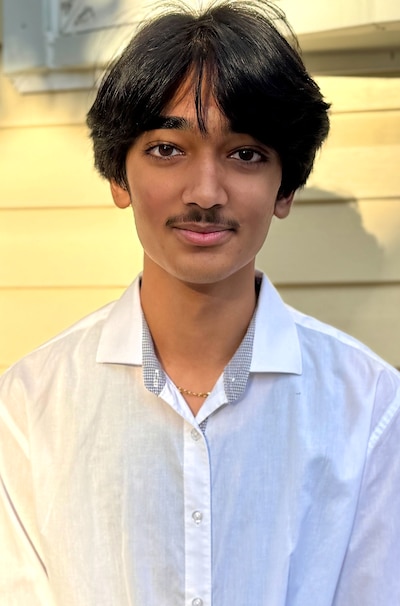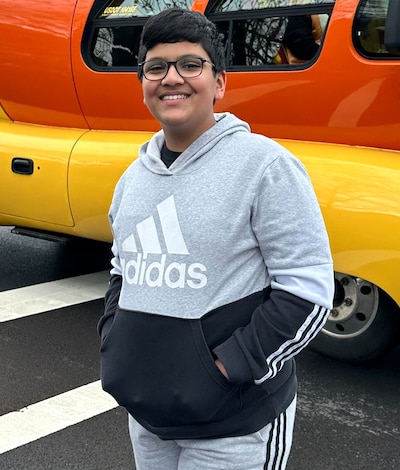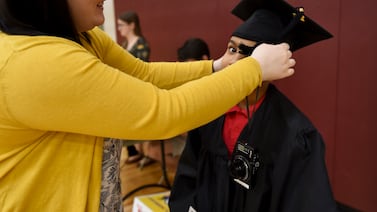This is republished as part of a series in collaboration with the Headway Election Challenge. Chalkbeat and Headway at The New York Times will ask young people to share their insights and perspectives throughout the 2024 presidential election.
Arnav Goyal, 14, lives in Powell, Ohio, about 30 minutes north of Columbus. In 2020, Donald J. Trump, the Republican nominee, won Delaware County, where Powell is, by 6.9 points. Mr. Trump carried Ohio by a full eight points.
Jaden Puttiram, 17, lives in South Ozone Park in Queens — a place that told a much different political story. Joseph R. Biden Jr. won Queens County by about 45 points.
As the Headway Election Challenge, in collaboration with Chalkbeat, has shown week after week, teenagers like Goyal, a freshman at Olentangy Liberty High School, and Puttiram, a senior at Thomas A. Edison Career and Technical Education High School, are closely following the upcoming election, which is just two weeks away.
Though they come from politically different parts of the country, they agree on one thing: Representation in politics goes beyond just identity.
The issues matter most
Mr. Goyal and Mr. Puttiram both say that when it comes to identity, Vice President Kamala Harris’ South Asian and Caribbean heritage partly mirrors their own. Mr. Goyal’s family originates from India, while Mr. Puttiram’s family is Indo-Guyanese.
But their support for different candidates reveals a common dynamic among our respondents: Identity may foster connection, but issues drive political preferences.
Goyal identifies as a conservative and supports Trump. He said his political views are shaped by family values, his own curiosity, and research. “I feel like just basing it off of identity would just be like a weird situation,” he said about representation in politics. “So I think values are much more important than identity.”
Puttiram, on the other hand, supports Harris. “One of the issues that Kamala Harris is focusing on is tax cuts for middle-class families,” he said, adding that he believes her proposed tax cuts will benefit his family.

Last week, we asked challenge participants how well-represented they felt on the issues that matter to them. When asked about representation on the issues, about 30 percent of teens felt “mostly” represented, but none felt “completely” represented. Only about 11 percent said they didn’t feel represented at all.
We also asked how well their identities were represented in their area’s slate of candidates. About 6 percent said they were “completely” represented by the candidates on the ballot, with nearly 17 percent saying they were “mostly” represented. While identity is important, many teens feel policy and action are what matters most.
Social media ambivalence
Are young people’s opinions getting heard? According to the teenagers we’ve heard from, the answer seems to be kind of. More than three-quarters responded with either “a little” or “somewhat.”
Nearly all the teens we’ve interviewed have expressed a complicated relationship with social media, where young people often set the tone and the agenda. It’s a place of discovery, outreach, and action, but it also provokes plenty of skepticism, both about what gets shared and how politicians use it.

Goyal believes that some politicians are using social media to reach young voters and encourage participation, while others “are still neglecting social media and neglecting young people and sticking to their complete and total base of old folks.”
From Puttiram’s perspective, teenagers seem to be more empowered and engaged than in previous elections. He said he has noticed more articles, more videos, more “everything” about the election.
“There’s a lot of people taking action in my age group,” he said.
Parents: The ultimate influencers
The teenagers we have connected with said parents were a significant influence in shaping their political opinions, followed by teachers, friends, and social media. While some teenagers this year have told us they diverge from their families’ politics and sometimes avoid the conversation, most of our respondents said family discussions exposed them to political ideas.
Puttiram said discussions with his parents had shaped his political awareness and sparked his interest in politics. He also credits his government teacher with helping him scrutinize candidates’ websites and campaign speeches.
Although he mostly shares his family’s politics, Goyal said he regularly researched candidates and policies on his own. “My parents don’t have an oversized influence on my politics, but they do tend to have, like, a subtle influence,” he said.
Goyal’s interest in politics began when he was just 10. “Right after the 2020 election, I remember my parents put some of it on TV,” he said.
That glimpse of the election process fascinated Goyal, he said. “I just decided to, you know, take a look into what it is,” he said. “And then I just fell into that rabbit hole and never escaped.”
On to Week 8, with less than two weeks to Election Day!
Week 8: What do you expect from the 2024 election?
As the critical day gets closer, we want to take a snapshot of how young people envision the election will play out. What are their hopes, expectations, and fears for what will happen on and after Election Day? How big a role do they think their peers will play in the outcome?
We want to once again open up these questions to all teenagers.
After the election, we’ll check back with participants to understand whether their expectations matched reality, and what they have taken away from what happened. The moment the votes start being counted, our memories of living through this election will be shaped by the results. So if you’re a teenager, we hope you record your thoughts now before the outcome is set.






